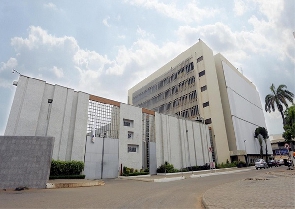 The Bank of Ghana Headquarters
The Bank of Ghana Headquarters
Mr. Kwame A. Oppong, the Director for Fintech and Innovation at the Bank of Ghana (BoG), has emphasized the regulator's dedication to ensuring the protection of consumer privacy by partnering with other stakeholders such as the Cyber Security Authority to bring to book companies that breached data privacy laws of individuals. Mr Oppong made these remarks at MTN Ghana's 2023 MoMo Season Forum held at the Kempinski Hotel in Accra.
He pointed out key pillars for onboarding requirements that would improve access to basic financial services for Ghanaians and noted that customer recourse mechanisms would also help to build trust. He said that it was necessary to ensure that those mechanisms urged customers to embrace digital financial usage. The BoG, he said, was considering an open banking policy and urged businesses to conduct market supervision to ensure safety.
Mr Oppong identified putting consumers at the center of policies and projects for them to utilize products and services, and responsive and agile collaboration to achieve policy goals as ways to address the barriers to the adoption of digital payments in Ghana.
Madam Sylvia Otuo Acheampong, Head of Product and Services at Mobile Money Limited- MTN Ghana said that partnerships and collaboration were necessary to ensure that barriers around digital financial use were productive.
"Looking at the ecosystem, the focus is moving to partnership payments, that is merchants who are benefiting from the Fintech space rather than person to person. We are looking at dynamic pricing, some will be tiered and some will be volume-based” she added.
She hoped that the current E-levy tax would stay and said that they would engage merchants in other ways to ensure that they were not overburdened with the tax payments.
She also noted that further education was necessary on financial fraud-related issues especially due to the dynamic ways fraudsters operated .
Speaking to participants at the forum, Mr Eric Kortey, Country Manager of Cellulant Ghana Limited, a fintech company said that Ghana had made significant strides in changing consumer behaviours concerning digital payments systems.
He noted that a BoG report indicated that between June 2021 and June 2023, registered Mobile Money accounts grew from 44.3 million to 59.7 million. However, the rate of growth of active users was much lower.
Mr Kortey said that barriers such as the increased rate of online fraud and the fear of losing money impacted the use of digital payments in Ghana.
He urged the expansion of mobile phone accessibility, the network of Mobile Money agents, mobile networks and infrastructure development, and a collaboration with local businesses as well as the offer of incentives for using digital platforms in the form of discounts and loyalty programmes as ways to boost digital payments usage. Digital payments in Ghana will be boosted if transactions are heavily discounted especially for those in rural areas he added.
Madam Winifred Kotun, the CEO of Eagle Innovations said that the current digital literacy rate was as low as 32 percent which she described as “woefully inadequate”.
She said that to improve knowledge in digital payment platforms and usage, relatable tools and mediums of mass community-based education programs should be held.
Madam Kotin also called for the presence of innovative value-added services for retention for merging Micro, Small, and Medium-scale enterprises.
To maintain the values achieved in the use of digital payments, she urged the building of financial payment layers through innovations such as data and Artificial Intelligence (AI), provision of analytics and reporting for merchants as well as marketing and promotions.
Mr Archie Hesse, the CEO of GHIPS noted that GhIPSS offered access to all banks, Mobile Money Operators among to other on their platforms to reduce cost and promote digital payment access.
“We are not sharing enough of development works as a country if there’s to be growth in the use of digital payments”, he added.
He disclosed that GhIPSS would be engaging fintechs in the country to offer them preferential pricing and would also partner with some tertiary institutions in the country to offer internships for students in computing.
He urged better relationships and workshops for fintechs to support them accordingly.